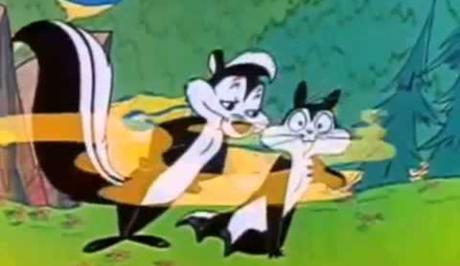Last week, a New York Times reporter who apparently believes there is no actual news to cover at present took to Twitter to claim that the Looney Tunes character Pepe Le Pew “contributes to rape culture”, because obviously there was no such thing as rape prior to the appearance of theatrical cartoons in the 1930s. Rather than merely consider this idiocy as one more part of the growing lust for censorship of basically everything and everyone not pre-approved by the Grand High Board of Puritans, let’s consider the particular nastiness of this repellent specimen of malodorous moralism.
First and foremost, this pearl-clutcher proceeds from the typical assumption (beloved of humorless scolds without even the most rudimentary knowledge of the history of the medium) that anything animated is “for children”. The Looney Tunes were comedic theatrical shorts intended mostly for adults, shown before Warner Brothers films in theaters to fill out an evening of viewing. When in the 1950s, the young television industry started mining Hollywood for content to fill its programming schedules, cartoons were naturally part of that, and when television became the default evening entertainment in the 1960s, theatrical cartoons were one of the casualties of Hollywood’s struggle to survive. By the 1970s, Americans had succumbed to the collective delusion that any entertainment involving illustrations must be the sole province of children, despite many of them being old enough to remember a time when even housewives, GIs and businessmen read comic books, and most of them being old enough to remember prime-time animated shows such as The Flintstones. Illustrated entertainment went from being a medium also appreciated by children to one abandoned almost entirely to children, and though that began to change again in the 1980s, authoritarians still cling like embedded ticks to their battle cry “THE CHILDREN™!!!” as an excuse for censorship of any and all illustrated entertainment (including comic books, anime, South Park, and yes, Looney Tunes), because their desire isn’t to “protect children”; it’s to cram all of society into a government-controlled nursery school where No Fun Shall Be Had.
As a child, I didn’t find Pepe Le Pew funny at all, because I lacked the necessary frame of reference to see the humor. Like so many Looney Tunes characters, Pepe is a grotesquely over-the-top burlesque of a particular type of person, in this case the clueless man who, despite being repulsive to others, has convinced himself that he is the second coming of Casanova. Pepe isn’t the hero of his cartoons; he is the butt of the joke, a person so clueless he doesn’t even realize that he literally reeks. His creators aren’t celebrating him; they are mocking him, and only women who have endured the attentions of his real-life counterparts can fully appreciate the mockery. Censors, on the other hand, are chronological adults burdened with a child’s view of a universe without free will, where things just happen because of malign forces from outside of themselves; they are therefore not only impervious to the humor, but see it as a source of evil magic that programs passive viewers. Frankly, I’m sick to death of moronic tabula rasa arguments proposed by dimwits whose entire grasp of psychology amounts to thirdhand Skinneresque pseudo-intellectual rot. Garbage people who see humans as machines to be programmed also invariably have cartoonish views about sex work, and usually support policies that allow steroidal thugs to rape women and call it “rescue”. And it takes a truly Loony level of hypocrisy to be more concerned about the “rapey” behavior of cartoon skunks from the last century than about actual rapes of marginalized women by present-day government officials.
